
Home
Services
About us
Blog
Contacts
Coffee Shop App Development Company: Building Next-Generation Mobile Solutions for the Thriving Coffee Industry
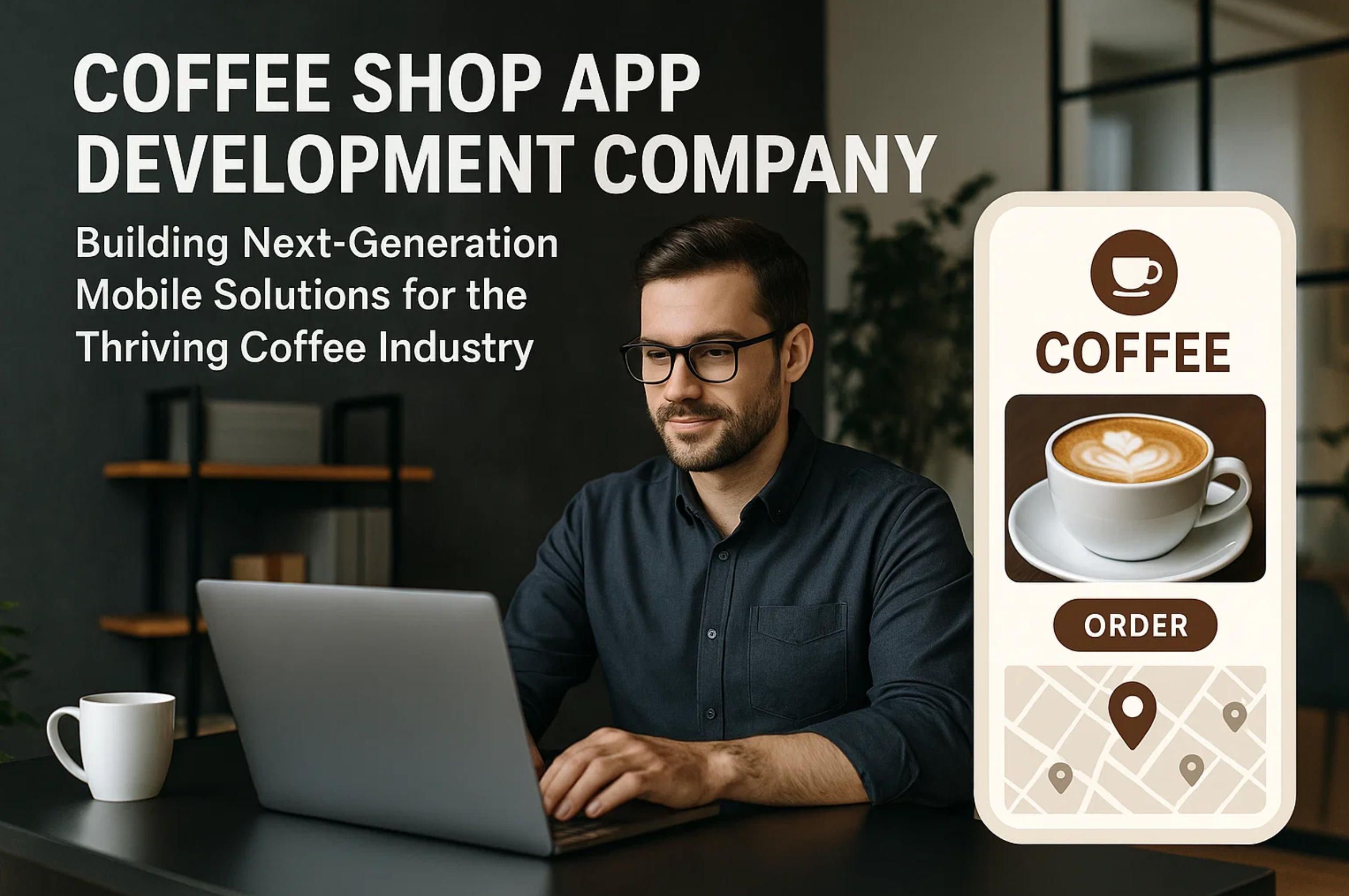
1. The Mobile App Revolution in Coffee Culture
2. Comprehensive Features Every Successful Coffee Shop Application Must Include
3. The Scooter Coffee App: An Instructive Case Study in Strategic Mobile Development
4. The Biggby Coffee App: Comprehensive Analysis of a Feature-Rich Implementation
5. Advanced Coffee Shop Finder Technology: Connecting Customers with Perfect Brewing Experiences
6. Revolutionary Loyalty Concepts: Beyond Traditional Points and Discounts
7. Essential Technical Architecture Components for Professional Coffee Shop Applications
8. Comprehensive Testing and Quality Assurance Protocols for Coffee Shop Applications
9. A-Bots.com: Your Strategic Partner for Custom Coffee Shop App Development
10. Professional Quality Assurance and Testing Services
11. Embracing the Future of Coffee Shop Technology
The coffee industry stands at a technological crossroads. With 62% of Americans drinking coffee daily (https://pos.toasttab.com/blog/on-the-line/coffee-shop-industry-trends-and-statistics) and the global coffee market projected to reach $473 billion in combined revenue by 2025 according to market research from Statista (https://www.menutiger.com/blog/coffee-shop-industry-trends), mobile applications have transformed from luxury additions to essential business infrastructure. For coffee shop owners navigating this digital-first marketplace, selecting the right coffee shop app development company represents a make-or-break decision that directly impacts customer loyalty, operational efficiency, and bottom-line profitability.
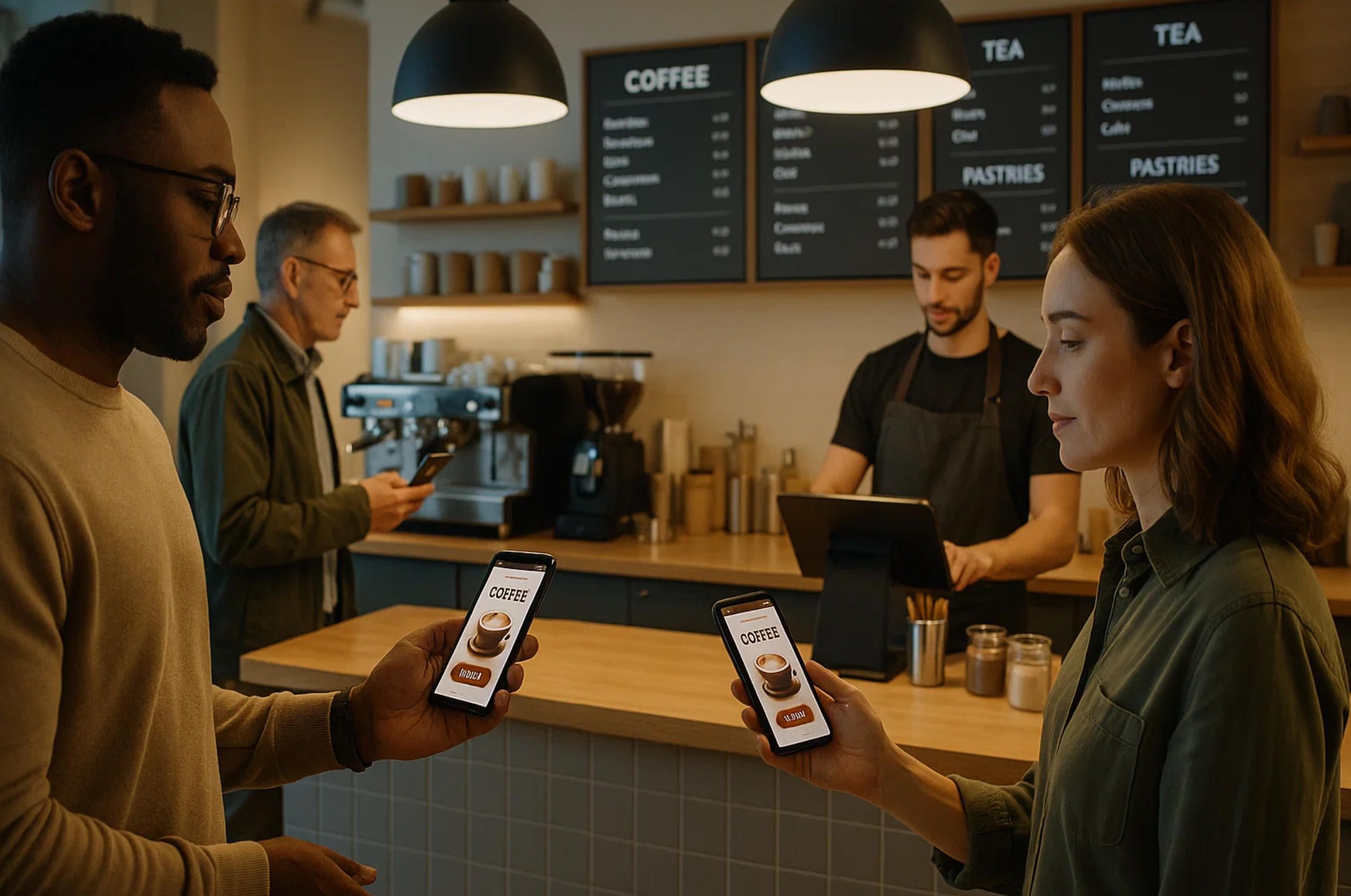
1. The Mobile App Revolution in Coffee Culture
The transformation is quantifiable and undeniable. Research from DoorDash reveals that 70% of consumers ordered food delivery in the past month, with 33% reporting increased delivery habits compared to the previous year. This behavioral shift extends powerfully into the coffee sector, where 48% of US consumers now regularly use cafe and restaurant apps for ordering. As one industry analyst noted: "Mobile ordering has reshaped how consumers interact with coffee shops, creating expectations for speed and convenience that traditional service models simply cannot meet."
The coffee apps market itself tells a compelling growth story. Valued at $110 million in 2024 according to Business Research Insights (https://www.businessresearchinsights.com/market-reports/coffee-apps-market-116846), projections indicate explosive expansion to $390 million by 2033, representing a compound annual growth rate of 14.9%. This growth trajectory reflects fundamental changes in consumer behavior where convenience, personalization, and speed define the modern coffee experience. A professional coffee shop app development company understands these market dynamics intimately and creates solutions addressing real business challenges while anticipating future trends.
"The coffee shop industry is recovering and evolving simultaneously," states a recent Toast report on coffee shop trends. "U.S. coffee chain sales are growing, and the number of coffee shops is exceeding pre-pandemic levels, but consumer preferences are shifting dramatically toward digital interactions." Coffee shops that fail to embrace mobile technology risk losing market share to more digitally-savvy competitors.
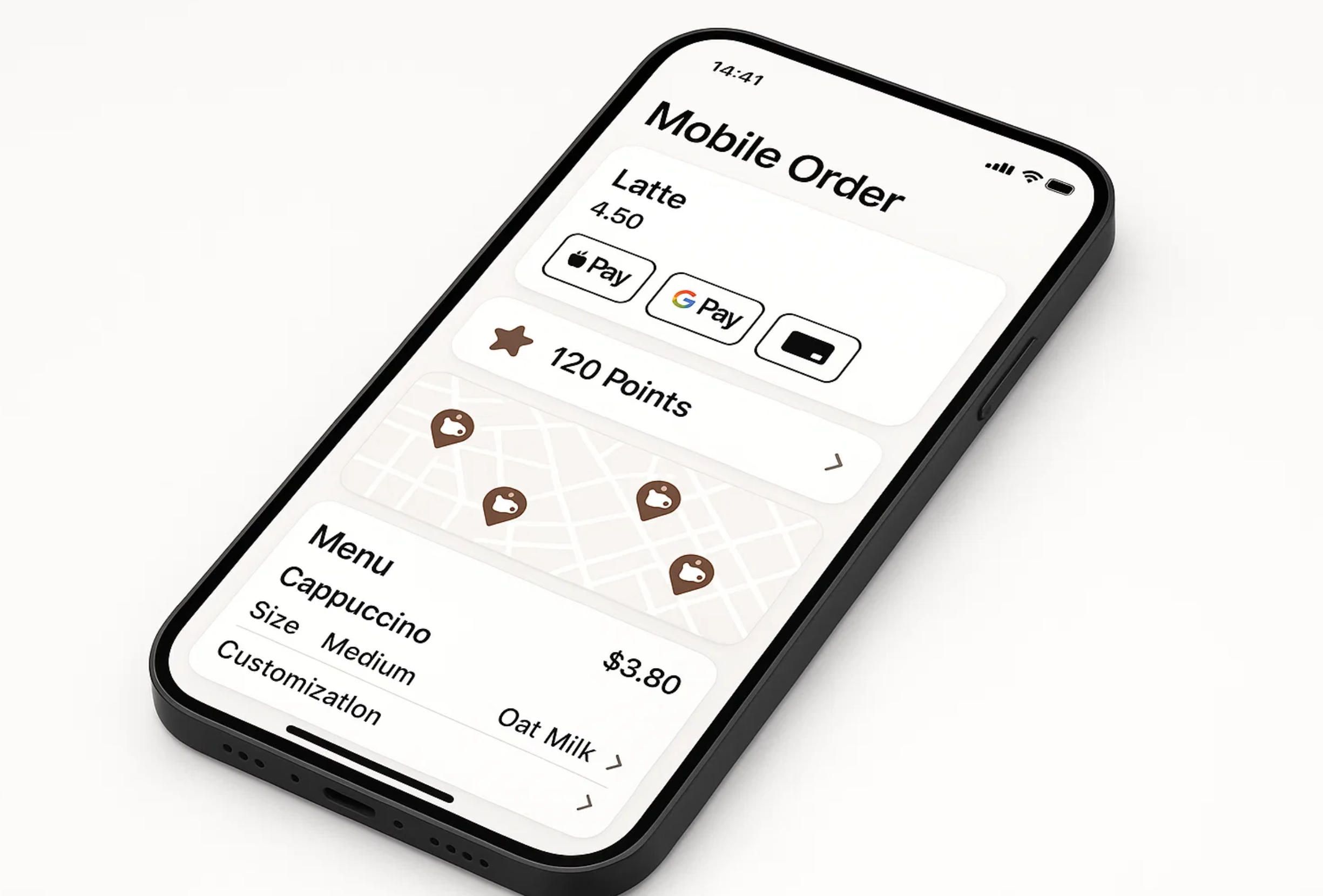
2. Comprehensive Features Every Successful Coffee Shop Application Must Include
Modern coffee shop applications share critical features that enhance both customer experience and operational efficiency. When partnering with a coffee shop app development company, business owners should insist on these essential capabilities:
Mobile Order-Ahead Functionality
The cornerstone of contemporary coffee apps enables customers to place orders before arriving, dramatically reducing wait times and improving throughput during peak hours. Research consistently shows that 75% of consumers expect to receive their quick-service orders in five minutes or less, making speed a non-negotiable competitive advantage. A skilled coffee shop app development company designs order-ahead systems that integrate seamlessly with kitchen display systems and point-of-sale platforms, ensuring accurate order routing and preparation timing.
Comprehensive Payment Integration
Modern payment processing must support multiple methods including credit cards, digital wallets like Apple Pay and Google Pay, and stored value accounts. This flexibility accelerates transactions while providing customers with their preferred payment options. The best implementations process payments securely while collecting valuable transaction data that informs inventory management, menu optimization, and marketing decisions. Advanced coffee shop app development companies implement tokenization and encryption protocols ensuring PCI-DSS compliance while protecting customer financial information.
Sophisticated Loyalty and Rewards Programs
Customer retention drives profitability in the coffee business, and well-designed loyalty programs prove remarkably effective. Studies indicate customers enrolled in app-based loyalty programs spend 67% more than non-members, creating substantial revenue increases without corresponding cost inflation. A competent coffee shop app development company designs reward systems encouraging repeat visits through points accumulation, tiered status levels, and personalized offers based on purchase history and customer preferences.
The most successful programs incorporate behavioral psychology principles, creating emotional connections that transcend simple transactions. Gamification elements like status levels, achievement badges, and exclusive perks for top-tier members drive engagement and create communities of brand advocates.
Location-Based Services and Coffee Shop Finder Technology
Helping customers discover nearby shops represents critical functionality, especially for multi-location chains and businesses targeting travelers or new residents. Advanced coffee shop finder capabilities use GPS technology displaying nearby locations on interactive maps complete with real-time information including operating hours, current wait times, and available amenities. This functionality proves especially valuable when integrated with route planning, allowing customers to locate convenient stops along their commutes or travel routes.
For coffee shop app development companies creating branded applications, implementing robust coffee shop finder features provides strategic advantages. The technology must handle various scenarios including urban environments with multiple nearby locations, suburban areas with spread-out stores, and rural regions where the nearest shop might be significant distance away.
Menu Customization and Order Management
Customers expect complete control over their orders, from milk alternatives to flavor shots and special preparation instructions. Comprehensive customization options reduce order errors while enhancing satisfaction. The interface must present these options intuitively without overwhelming users with excessive choices. A professional coffee shop app development company conducts user testing to optimize the customization flow, balancing completeness with usability.
The following core features represent non-negotiables for any serious coffee shop application:
- Real-time order tracking showing preparation status and estimated completion times
- Saved favorite orders for quick reordering of customary beverages
- Dietary information and allergen warnings for all menu items
- Push notifications for order readiness, promotional offers, and new menu items
- Digital gift card purchase and redemption capabilities
- Integrated tipping functionality allowing customers to show appreciation for excellent service
- Order history and receipt access for expense tracking and budgeting
- Store locator with filtering options for specific amenities or services
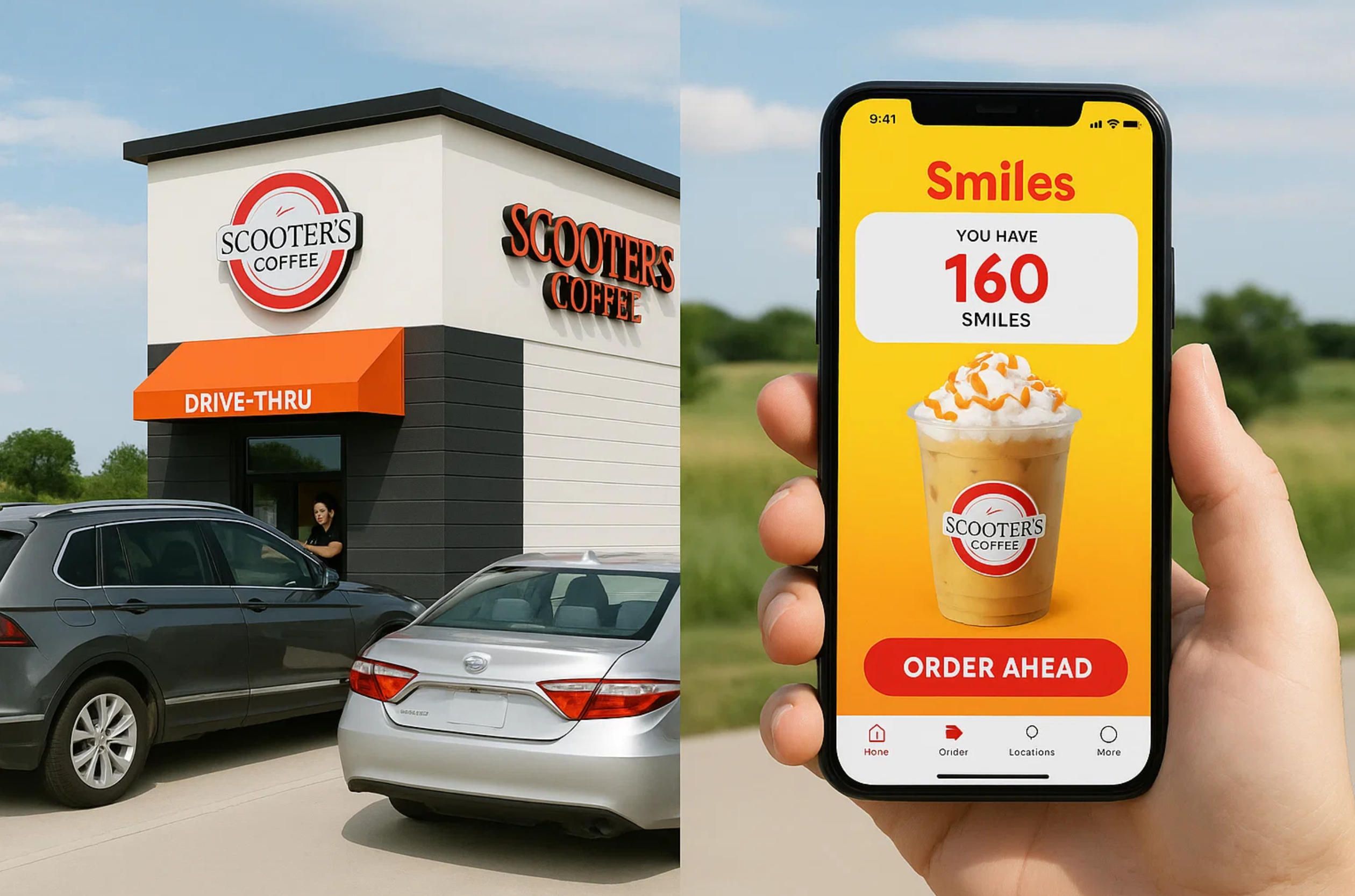
3. The Scooter Coffee App: An Instructive Case Study in Strategic Mobile Development
Understanding successful implementations provides valuable insights for coffee shops considering app development. The scooter coffee app exemplifies how strategic mobile development drives measurable business growth across multiple dimensions.
Company Background and Market Position
Scooter's Coffee began in 1998 when founders Don and Linda Eckles opened their first drive-thru coffeehouse in Bellevue, Nebraska (https://en.wikipedia.org/wiki/Scooter's_Coffee). The company took its name from the concept of helping customers "scoot in and scoot out" quickly, prioritizing speed without sacrificing quality. in 1998 when founders Don and Linda Eckles opened their first drive-thru coffeehouse in Bellevue, Nebraska (according to Wikipedia). The company took its name from the concept of helping customers "scoot in and scoot out" quickly, prioritizing speed without sacrificing quality. Over more than two decades, Scooter's Coffee expanded to become the second-largest drive-through coffee chain in the United States, with over 800 locations across 29 states as of July 2024.
The company's headquarters in Omaha, Nebraska houses Harvest Roasting, their affiliated roasting operation ensuring quality control over coffee sourcing and preparation. The signature beverage, the Caramelicious, has become synonymous with the brand, representing their commitment to indulgent specialty drinks. The brand promise— "Amazing People, Amazing Drinks… Amazingly Fast!"— guides every aspect of operations, from franchisee training to app development priorities.
Detailed Analysis of the Scooter Coffee App Features
The scooter coffee app demonstrates sophisticated understanding of customer behavior and motivation psychology. At its core, the application implements a rewards system where customers earn "Smiles" for every purchase, creating gamified engagement encouraging repeat visits. This clever naming convention humanizes the loyalty program, making points accumulation feel personal and emotionally rewarding rather than purely transactional.
The scooter coffee app features a tiered status system that brilliantly leverages competitive psychology. Customers visiting nine times monthly reach "Bestie" status, earning 10 bonus Smiles per order. Those achieving 15 visits unlock "Ride-or-Die" status with 15 bonus Smiles and exclusive offers. This sophisticated approach creates clear progression paths motivating increased visit frequency. The status tiers reset monthly, creating urgency and preventing complacency among active users.
Mobile ordering capabilities within the scooter coffee app allow customers to place orders for pickup at their preferred locations, with the system earning users 5 Smiles per dollar spent when ordering ahead. This creates clear financial incentives for app usage while improving operational efficiency for franchisees. The enhanced reward rate for mobile orders reflects the operational value of orders placed through the app versus in-person transactions.
Payment options showcase thoughtful design prioritizing convenience. The Scan & Pay functionality allows customers to scan QR codes at the drive-thru window for fast, contactless transactions. When customers load funds onto their app accounts, they earn the enhanced 5 Smiles per dollar rate even when using Scan & Pay rather than mobile ordering. This flexibility accommodates different customer preferences while consistently incentivizing app engagement.
The scooter coffee app also features digital gifting capabilities, allowing users to send gift cards to friends and family directly through the application. Recipients receive redemption links via email, creating frictionless pathways for new user onboarding. This social component extends the app's utility beyond individual transactions while serving as a customer acquisition tool. Gift card transactions require no physical card production or distribution, reducing costs while eliminating friction in the gifting experience.
Technical Architecture and Integration Challenges
Development of the scooter coffee app required complex integration with point-of-sale systems, payment processors, and customer relationship management platforms across hundreds of franchise locations. The technical architecture supports real-time order processing, secure payment handling, and accurate rewards tracking across multiple locations with different operational systems and configurations.
Each franchisee operates independently with their own local management and potentially different POS hardware and software. The scooter coffee app must communicate effectively with this diverse technical ecosystem while presenting a unified brand experience to customers. This complexity underscores why coffee shops benefit dramatically from partnering with an experienced coffee shop app development company capable of navigating technical challenges while delivering polished, reliable user experiences.
The scooter coffee app handles edge cases gracefully, such as when customers place orders but don't complete pickup, when network connectivity interrupts during payment processing, or when inventory changes affect product availability. These scenarios require robust error handling and clear customer communication to maintain trust and satisfaction.
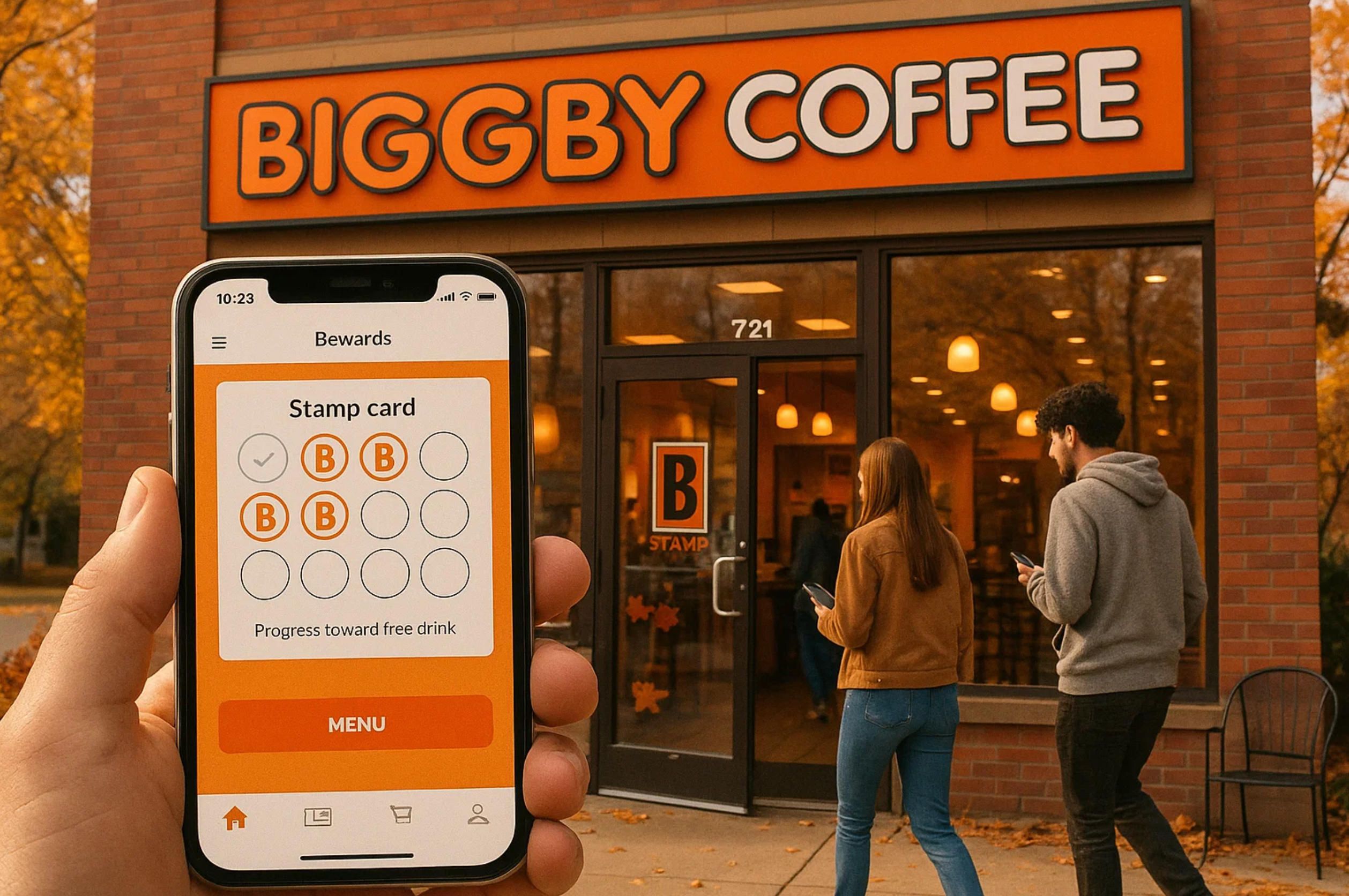
4. The Biggby Coffee App: Comprehensive Analysis of a Feature-Rich Implementation
The biggby coffee app provides another illuminating example of comprehensive mobile application design for the coffee industry, demonstrating how independent franchises can maintain brand consistency while respecting local autonomy.
BIGGBY Coffee History and Brand Philosophy
BIGGBY Coffee's story begins in 1995 when co-founders Bob Fish and Mary Roszel opened their first location in East Lansing, Michigan, in a building previously occupied by an Arby's restaurant (according to Wikipedia). Originally named Beaner's Coffee, the company rebranded to BIGGBY Coffee in 2007-2008 to avoid negative connotations the original name carried.
The company's growth philosophy emphasizes local ownership through franchising. Michael McFall, who started as a minimum-wage barista at the first location in 1996, became equal partners with Bob Fish after a famous four-hour walk around Michigan State University's campus in 1997. This partnership sealed with a handshake exemplifies the company's relationship-first approach to business. Today, BIGGBY Coffee operates over 430 locations across 13 states, headquartered in East Lansing, Michigan.
The brand's cultural values— "Make Friends, Have Fun, B Yourself, and Share Great Coffee"—inform every business decision including app development priorities. As Bob Fish states in interviews: "We're really in two industries— franchising and specialty coffee— and those two fit together well. Coffee shops really thrive if owned locally. Franchising allows you to have that local ownership, while also benefiting from proven systems and procedures."
In-Depth Examination of the Biggby Coffee App Capabilities
The biggby coffee app centers on a loyalty program where customers buy 12 full-priced drinks and receive the 13th free. This straightforward value proposition appeals to regular customers while the app makes tracking progress effortless. Unlike complex point systems requiring calculations and conversions, the biggby coffee app uses a simple stamp-card model translated to digital format. This design choice proves that sophisticated technology can deliver elegantly simple solutions.
The loyalty program automatically tracks qualifying purchases, with clear visual indicators showing progress toward the next free drink. Customers understand immediately where they stand and how many purchases remain before earning their reward. This transparency builds trust and creates anticipation, encouraging customers to return sooner rather than letting momentum fade.
Online ordering through the biggby coffee app lets customers skip lines by ordering ahead for in-store pickup at participating locations. The interface allows comprehensive drink customization, enabling users to modify every aspect of their beverages from size to milk type to flavor additions and special instructions. Saved favorite orders enable quick reordering of customary beverages, reducing friction for regular customers while ensuring consistency in their preferred drinks.
Location search functionality helps customers find participating stores and view specific features of each location including operating hours, available amenities like drive-thru windows or outdoor seating, and current wait times during busy periods. The store locator uses distance calculations showing nearest locations first, with options to search by zip code for planning future visits or travel.
Card management features in the biggby coffee app allow users to add physical BIGGBY cards to their accounts for easier tracking and balance management. Customers can load funds onto their accounts for streamlined ordering and payment, with the ability to set up automatic reloads ensuring they never run out of balance unexpectedly. This flexibility accommodates different customer preferences while centralizing rewards tracking and transaction history.
User Feedback and Iterative Improvement
The biggby coffee app demonstrates that successful implementations require continuous iteration based on user feedback. Customer reviews highlight areas for improvement including more detailed drink descriptions showing ounces per size and espresso shot counts, food menu integration beyond beverages, and enhanced mobile order accuracy through clearer customization interfaces.
These insights remind coffee shop app development companies that the launch represents just the beginning of the application lifecycle. Successful apps evolve continuously, incorporating user feedback, adapting to changing consumer preferences, and leveraging new technologies as they become available. The most effective coffee shop app development companies establish ongoing support relationships rather than treating delivery as the end of engagement.
Technical Considerations for Franchise Operations
Technical considerations for the biggby coffee app include franchise system integration, ensuring orders route correctly to independently-owned locations while maintaining consistent brand experience across all touchpoints. The app must accommodate location-specific menu variations reflecting local supplier relationships, seasonal availability, and franchisee preferences while presenting a unified customer interface.
Different franchise locations may operate different hours, accept different payment methods, or offer different amenities. The biggby coffee app handles this complexity transparently, displaying location-specific information clearly while preventing orders to closed locations or requesting unavailable items. These challenges require flexible architecture that an experienced coffee shop app development company can deliver through modular design and robust configuration management.
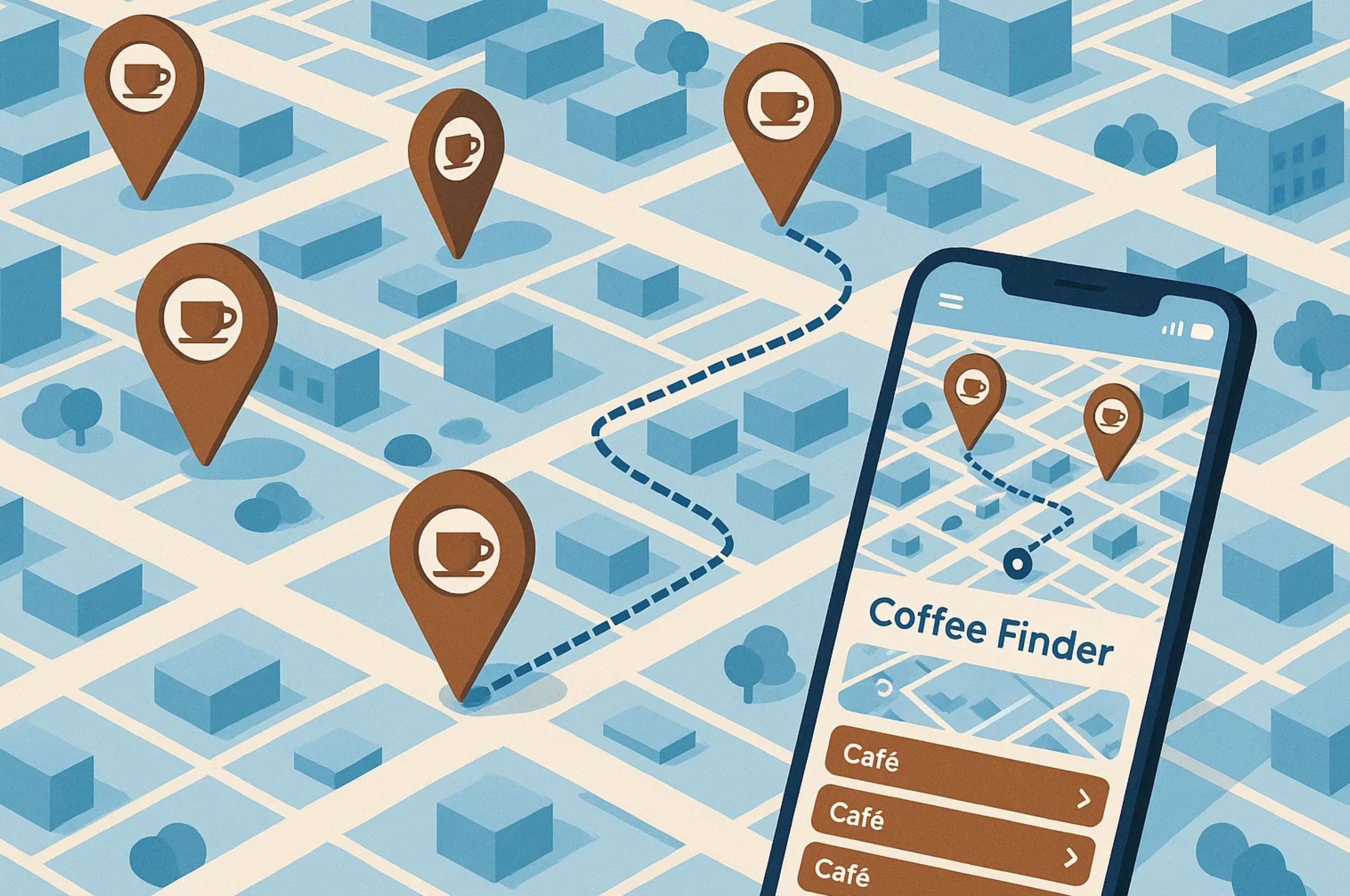
5. Advanced Coffee Shop Finder Technology: Connecting Customers with Perfect Brewing Experiences
Coffee shop finder functionality represents critical infrastructure within modern coffee applications, serving customers seeking quality experiences wherever they travel or relocate. As specialty coffee culture expands globally, enthusiasts demand tools discovering high-quality cafes in unfamiliar cities.
Dedicated Coffee Shop Finder Applications
Specialized coffee shop finder applications have emerged alongside branded coffee shop apps, each serving complementary use cases. Applications like European Coffee Trip curate over 5,000 specialty coffee shops across 39 European countries (according to the App Store). This coffee shop finder uses manual curation maintaining quality standards, helping coffee enthusiasts avoid disappointing experiences in new cities.
The application stores data offline, enabling users to browse and navigate without internet connectivity—a thoughtful design decision accommodating international travelers who may lack reliable data connections. The coffee shop finder includes filters for coffee preparation methods like espresso versus filter coffee, food offerings, plant-based options, and amenities like wifi access and laptop-friendly seating.
Roasters represents another popular coffee shop finder with global coverage spanning over 100 countries. This application allows users to discover specialty coffee shops worldwide, read reviews from fellow coffee lovers, and contribute their own ratings and photos. The social component transforms the coffee shop finder from simple directory to community platform where enthusiasts share knowledge, discoveries, and experiences.
Integration Opportunities for Branded Applications
For coffee shop app development companies creating branded applications, integrating coffee shop finder capabilities presents strategic advantages for multi-location chains. Customers benefit from finding nearest shops with real-time information like operating hours, current wait times, and special offerings. Independent shops joining coffee shop finder networks gain visibility among potential customers actively seeking quality coffee experiences.
Technical implementation of coffee shop finder features requires geolocation services providing accurate positioning, mapping integration displaying locations visually on interactive interfaces, and comprehensive databases containing detailed location information including addresses, contact details, operating hours, and amenity descriptions. Advanced systems incorporate user-generated content like reviews, ratings, and photos, requiring moderation systems and community management tools ensuring quality and appropriate content.
The best coffee shop finder implementations balance comprehensive data coverage with intuitive interfaces presenting information clearly without overwhelming users with excessive detail. Smart filtering allows customers to narrow results based on specific preferences or requirements, while intelligent sorting prioritizes most relevant locations based on distance, ratings, or other criteria.

6. Revolutionary Loyalty Concepts: Beyond Traditional Points and Discounts
Traditional loyalty programs based on points and discounts face increasing customer fatigue as saturation diminishes individual program effectiveness. Research from the 2015 Colloquy Loyalty Census reveals that the average US household participates in 29 different loyalty programs, creating fragmentation reducing perceived value of each program. Forward-thinking coffee shop app development companies explore alternative approaches delivering genuine value while differentiating clients from competitors.
The Subscription and Membership Model Emergence
Subscription and membership models represent one promising alternative gaining significant traction. In 2023, the World Coffee Portal reported that one-third of customers would prefer paying for subscriptions versus per-visit purchases. In 2024, Blank Street Coffee's membership service reached 5,000 members in just four months, demonstrating powerful appetite for this model.
These programs create predictable revenue streams while cementing customer habits through prepaid benefits psychology. Rather than "earning" rewards, subscribers "use" benefits they've already purchased, creating mental ownership and reducing barriers to visit frequency. Monthly subscriptions providing unlimited drinks or significant discounts for frequent visitors appeal to regular customers while providing coffee shops with capital for operational improvements and expansion.
The Revolutionary Bitcoin Accumulation Loyalty Concept
Cryptocurrency-based rewards present a revolutionary concept potentially transforming coffee shop loyalty programs fundamentally. Consider an innovative model where customers pay double the standard price for their coffee, with the base cost covering the beverage and the additional amount automatically converting to Bitcoin holdings on their behalf through integrated cryptocurrency exchange connections.
This approach creates a compelling accumulation mechanism tapping into Bitcoin's historical long-term appreciation trajectory. Rather than earning points toward future purchases that may or may not prove valuable, customers build investment portfolios through daily coffee habits. Over three to four years, accumulated Bitcoin could represent substantial value growth far exceeding typical loyalty rewards.
The Bitcoin accumulation model addresses customer fatigue with traditional discounts by completely reframing the value proposition. Instead of saving small amounts on future purchases, customers participate in wealth-building through consumption they're making anyway. This innovation requires partnership with a coffee shop app development company capable of integrating cryptocurrency transaction capabilities while ensuring regulatory compliance and implementing robust security measures.
Implementation would involve connecting the coffee shop app to cryptocurrency exchange platforms through secure APIs. Each purchase triggers automatic Bitcoin purchases at current market rates, with cryptocurrency deposited into customer wallets either within the app or external wallets they control. Transparent tracking shows customers their accumulated holdings and current value in both Bitcoin and fiat currency, gamifying the savings experience while building emotional investment in continued patronage.
Real-time value display creates psychological engagement as customers watch their coffee purchases appreciate over time. When Bitcoin prices increase, customers feel rewarded for their loyalty. During market downturns, the dollar-cost averaging inherent in regular small purchases mitigates risk while positioning customers for future appreciation.
This approach offers coffee shops powerful customer retention by creating substantial switching costs. Customers who have accumulated significant Bitcoin value through their favorite coffee shop become highly loyal, as moving to competitors means abandoning their accumulation strategy and starting fresh elsewhere. The program builds community around shared investment strategy, potentially supporting educational events about cryptocurrency and personal finance that deepen customer relationships beyond transactional interactions.
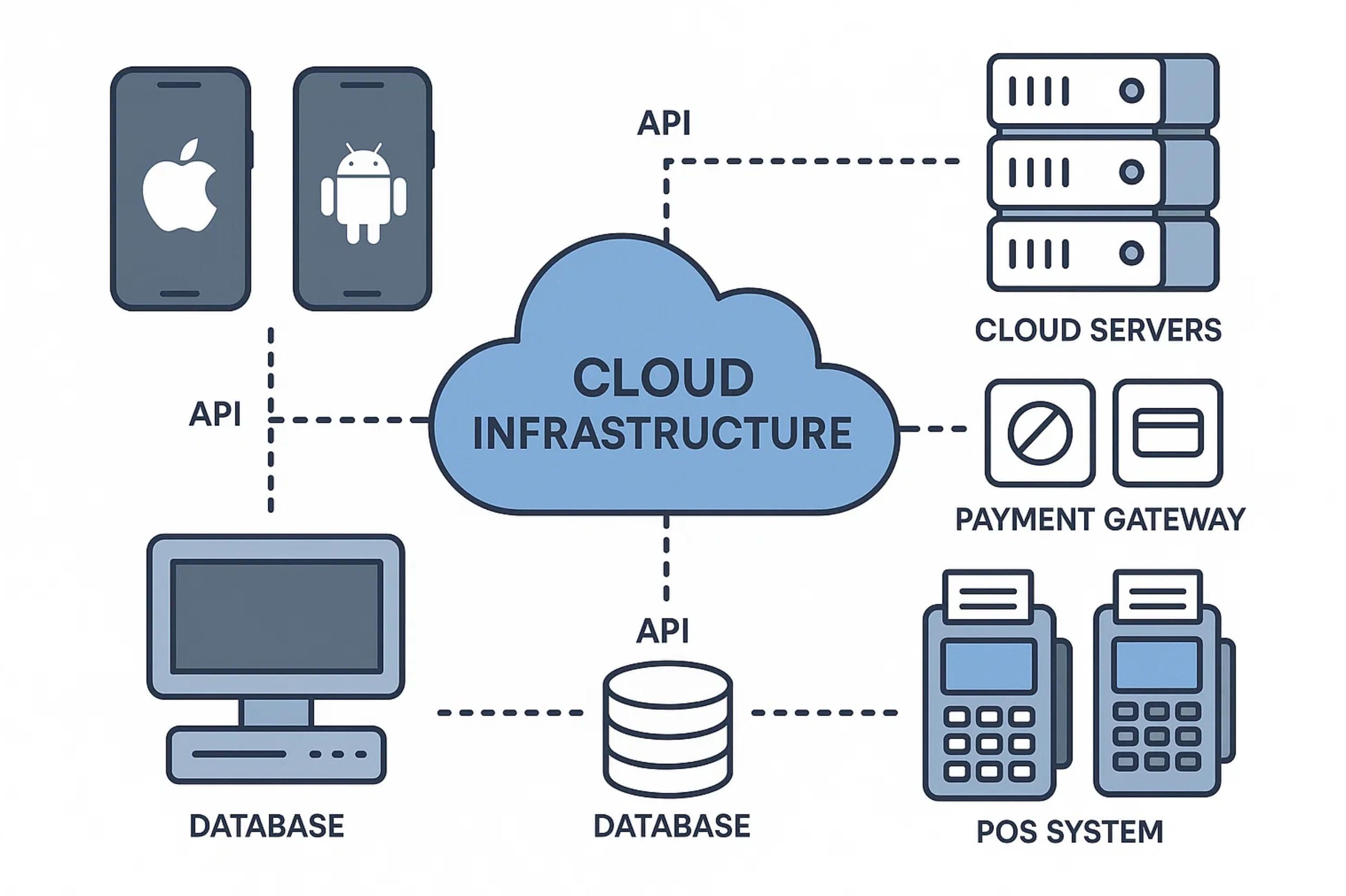
7. Essential Technical Architecture Components for Professional Coffee Shop Applications
Building reliable, scalable coffee shop applications requires sophisticated technical architecture addressing complex requirements while maintaining performance, security, and user experience quality. A qualified coffee shop app development company constructs systems handling these interconnected challenges:
Backend Infrastructure and Scalability
Backend infrastructure must support real-time order processing handling sudden traffic spikes during morning rushes and promotional events, inventory management tracking ingredient availability across multiple menu items and locations, payment processing executing secure transactions at high velocity, and customer data synchronization maintaining consistent profiles across multiple devices and platforms.
Cloud-based architectures provide scalability handling peak demand periods without performance degradation or service interruptions. Services like Amazon Web Services, Google Cloud Platform, or Microsoft Azure offer elastic compute resources automatically scaling based on load patterns. Microservices approaches allow independent scaling of different system components based on specific demands, optimizing resource utilization and cost efficiency.
Database architecture requires careful consideration balancing consistency requirements for critical data like payments and orders against performance needs for high-throughput operations. Modern coffee shop applications typically employ polyglot persistence using different database technologies for different use cases— relational databases for transactional data, document stores for flexible menu information, and caching layers for frequently accessed data.
Payment Security and Compliance
Payment integration requires absolute adherence to PCI-DSS standards protecting customer financial information throughout collection, transmission, and storage. Professional implementations never store raw card data, instead using tokens provided by payment processors like Stripe, Square, or Braintree. These tokens represent payment methods without exposing actual account numbers, enabling frictionless repeat purchases while maintaining security.
Multi-factor authentication and encryption protect customer accounts and transaction data from unauthorized access. Modern coffee shop apps implement biometric authentication on supported devices, allowing customers to confirm purchases using fingerprint or face recognition rather than memorizing complex passwords. This approach balances security with convenience, reducing friction without compromising protection.
Point-of-Sale System Integration
Point-of-sale system integration presents significant technical challenges as coffee shops use diverse POS platforms from different vendors with varying integration capabilities. The application must communicate effectively with systems from Square, Toast, Clover, and others to submit orders, retrieve menu information including pricing and availability, update inventory levels, and synchronize customer data for loyalty programs.
Robust API design and thorough testing across multiple POS platforms ensure reliable operation in diverse technical environments. Many coffee shop app development companies maintain partnerships with major POS vendors, gaining access to technical documentation, sandbox environments for testing, and support resources for troubleshooting integration issues.
Offline Functionality and Data Synchronization
Offline functionality enhances user experience by allowing customers to browse menus and prepare orders even without internet connectivity. When connection resumes, the app syncs data and submits prepared orders to the ordering system. This capability proves especially valuable for drive-thru scenarios where cellular signals may be inconsistent or in areas with unreliable network coverage.
Intelligent synchronization logic handles conflicts when data changes both locally and remotely during disconnection periods, presenting clear options to users when automatic resolution isn't possible. Local storage capabilities must balance functionality needs against device storage constraints, carefully managing cached data to provide good offline experiences without consuming excessive space.
Push Notification Systems and Engagement
Push notification systems drive engagement by alerting customers to new menu items, special promotions, reward availability, and order readiness updates. Sophisticated implementations personalize notifications based on customer behavior and preferences, improving relevance while avoiding notification fatigue leading to app deletion.
Notification timing considers customer habits and preferences, avoiding early morning or late night sends that might annoy rather than engage. Segmentation allows targeting specific customer groups with relevant messages— sending promotional offers to lapsed users, new item announcements to adventurous customers, and order reminders to those who frequently abandon carts before completing purchases.
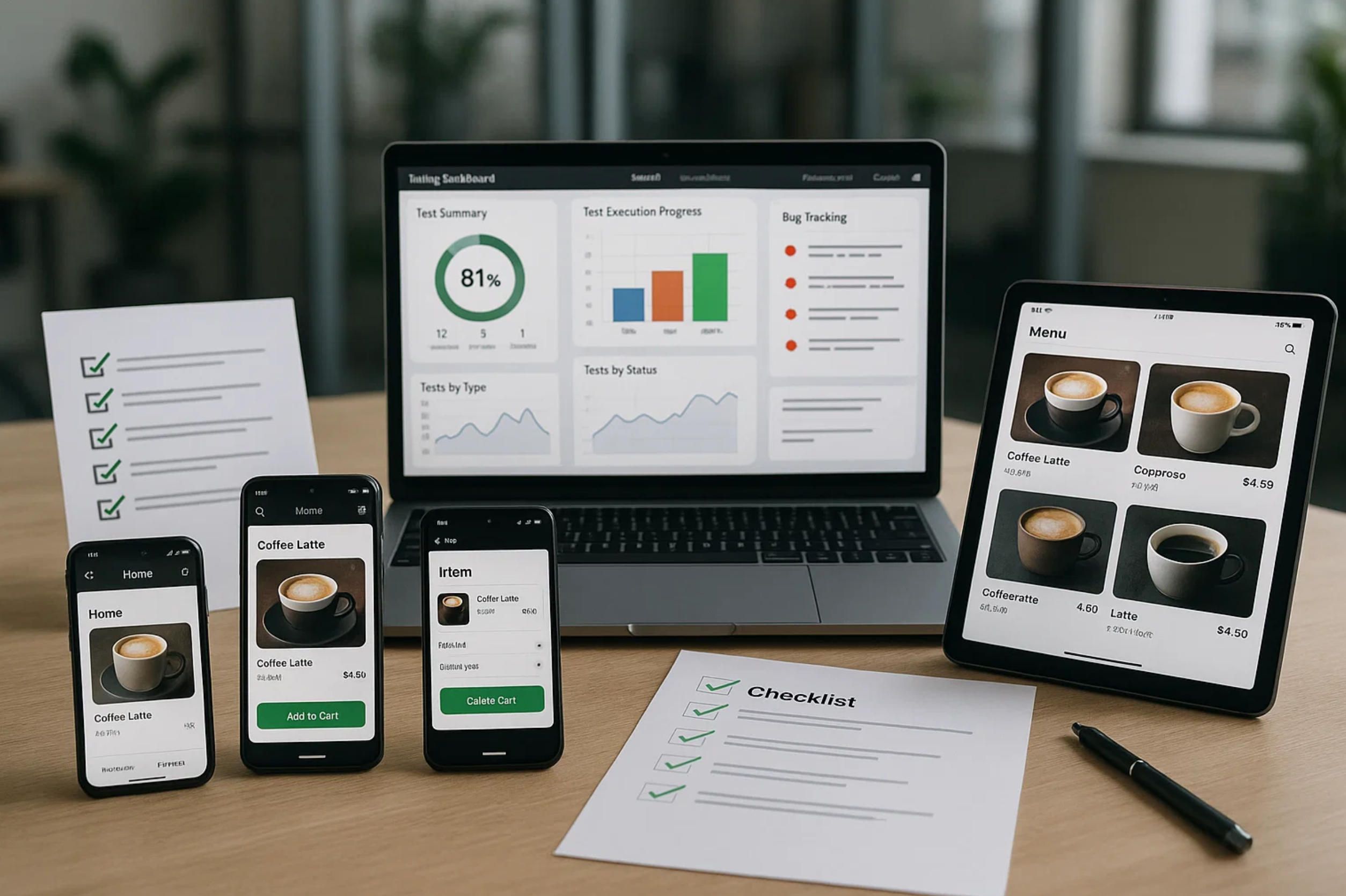
8. Comprehensive Testing and Quality Assurance Protocols for Coffee Shop Applications
A professional coffee shop app development company implements comprehensive testing protocols ensuring applications function flawlessly across diverse conditions, devices, and use cases. Quality assurance encompasses multiple testing dimensions:
Functional Testing Across Platforms and Devices
Functional testing verifies that all features work as designed across different devices, operating systems, screen sizes, and network conditions. Test scenarios must cover complete user journeys from app installation through account creation, browsing menus, placing orders, making payments, earning rewards, and using loyalty benefits. Each critical path requires validation under various conditions including optimal scenarios and edge cases.
Device fragmentation in the Android ecosystem requires testing on multiple phone and tablet models from different manufacturers, each with unique screen resolutions, hardware capabilities, and operating system customizations. iOS testing must cover multiple iPhone and iPad models ensuring compatibility with older devices many customers still use.
Performance Testing Under Variable Load Conditions
Performance testing ensures applications respond quickly under various load conditions from quiet periods to peak morning rushes when hundreds of customers simultaneously place orders. Load testing simulates high traffic volumes identifying bottlenecks, capacity limitations, and degradation patterns under stress.
Response time metrics track how quickly the app loads screens, processes searches, displays menu information, and completes transactions. Industry standards suggest pages should load within 2-3 seconds on standard network connections, with interactive elements responding within one second to maintain perceived responsiveness.
Security Testing and Vulnerability Assessment
Security testing identifies vulnerabilities that could compromise customer data or payment information through penetration testing attempting to exploit potential weaknesses, code reviews examining source code for common security flaws, and automated security scans using tools like OWASP ZAP identifying known vulnerability patterns.
Regular security audits should continue post-launch as new threats emerge and attackers develop novel exploitation techniques. A coffee shop app development company should include security assessments in ongoing maintenance agreements, providing peace of mind that applications remain protected against evolving threats.
User Acceptance Testing with Real Customers
User acceptance testing involves real customers using applications in production-like environments providing final validation before public launch. This testing ensures interfaces function intuitively and meet user expectations, uncovering usability issues that internal testing might miss.
Feedback gathered during UAT informs refinements before broader release, potentially preventing negative reviews and uninstall rates that would damage the app's reputation and adoption. Participants should represent diverse customer segments including different age groups, technical proficiency levels, and usage patterns to ensure the app works well for all target users.
9. A-Bots.com: Your Strategic Partner for Custom Coffee Shop App Development
A-Bots specializes in software design and development, offering comprehensive services for coffee shops seeking competitive advantage through mobile technology. With experience across more than 70 projects spanning web development, mobile applications, chatbots, and blockchain solutions, A-Bots brings deep technical expertise combined with business acumen to every engagement.
Development Excellence and Technical Capabilities
As your coffee shop app development company, A-Bots transforms conceptual ideas into concrete, production-ready results through structured processes defining goals, building detailed roadmaps, and delivering polished solutions that customers love using. The team understands both coffee industry dynamics and technical requirements necessary for successful implementations, bridging the gap between business objectives and technical realization.
A-Bots develops custom mobile applications using advanced technologies and frameworks ensuring optimal performance, maintainability, and scalability. Whether building new applications from scratch, enhancing existing systems with additional features, or migrating legacy solutions to modern platforms, the focus remains on creating solutions that measurably improve business performance and elevate customer experiences.
Deployment to Android and iOS marketplaces requires attention to platform-specific requirements, design guidelines, and review processes. A-Bots manages this complexity, ensuring applications meet all technical and policy requirements while presenting polished experiences consistent with user expectations on each platform.
Long-Term Partnership Approach
The company's long-term client relationships demonstrate commitment to ongoing partnership beyond initial development. Most clients engage A-Bots for at least 1.5 years, with some relationships exceeding five years of continuous collaboration. This continuity ensures applications evolve with changing business needs, consumer preferences, and emerging technologies.
Regular updates address bug fixes, add new features, optimize performance, and maintain compatibility with updated operating systems and devices. Security patches protect against newly discovered vulnerabilities, while design refreshes keep applications feeling modern and current. An experienced coffee shop app development company like A-Bots treats application launch as the beginning of a journey rather than the conclusion of a project.
Blockchain and Cryptocurrency Integration Expertise
For coffee shops considering innovative cryptocurrency loyalty programs like the Bitcoin accumulation model described earlier, A-Bots offers specialized blockchain development expertise implementing these advanced capabilities securely and effectively. The team stays current with emerging technologies and regulatory requirements, positioning clients at the forefront of industry innovation while ensuring compliance with applicable laws and regulations.
Cryptocurrency integration requires understanding exchange APIs, wallet management, secure key storage, transaction monitoring, and regulatory compliance across multiple jurisdictions. A-Bots brings this specialized knowledge to coffee shop app development, enabling implementations that would overwhelm general-purpose development shops lacking blockchain experience.
10. Professional Quality Assurance and Testing Services
Beyond development, A-Bots provides comprehensive testing services for coffee shops with existing applications requiring objective assessment and improvement recommendations. Professional quality assurance identifies performance issues, usability problems, and technical bugs diminishing customer experiences or creating operational inefficiencies.
Testing engagements evaluate applications across multiple dimensions including functionality verifying features work correctly, performance measuring response times and resource utilization, security assessing vulnerability to attacks and data breaches, and user experience evaluating intuitive design and satisfaction.
Detailed reports document findings with clear explanations accessible to non-technical stakeholders, prioritize recommendations based on impact and implementation effort, and provide actionable guidance enabling coffee shops to make informed decisions about improvements. For coffee shops uncertain whether to build new applications or enhance existing ones, A-Bots offers consulting services assessing current state and recommending optimal paths forward based on business objectives, budget constraints, and market positioning.
This objective guidance helps businesses allocate resources effectively while maximizing return on technology investments, avoiding common pitfalls like over-engineering solutions, neglecting critical features, or choosing inappropriate technologies for their specific needs and constraints.
11. Embracing the Future of Coffee Shop Technology
Mobile applications have evolved from competitive advantages to essential infrastructure for coffee businesses competing in today's digital marketplace. As consumer expectations continue rising and technology capabilities expand, coffee shops must partner with experienced coffee shop app development companies to remain competitive and capture growth opportunities.
The global mobile app market generates $935 billion in revenue annually (according to Statista), with the food and beverage category representing significant opportunity for well-executed applications. The coffee apps market specifically, projected to grow from $110 million in 2024 to $390 million by 2033, reflects the sector's rapid digital transformation and the substantial business value mobile applications deliver.
The most successful implementations combine proven features like mobile ordering, integrated payments, and loyalty programs with innovative concepts differentiating brands and creating emotional connections with customers. Whether implementing traditional approaches refined through years of industry evolution or exploring revolutionary ideas like Bitcoin accumulation programs that transform the value proposition entirely, the key is delivering genuine value resonating with target audiences and supporting long-term business objectives.
"The sustained success of Scooter's Coffee is about more than quality products; it's because of our commitment to doing right by our customers and each other, every day," states a company spokesman. This philosophy extends to technology decisions, where apps must enhance rather than complicate the coffee experience, adding value without creating friction or confusion.
A-Bots stands ready to help coffee shops navigate this technological landscape, whether building custom applications from scratch tailored to unique business models and customer bases, enhancing existing systems with new features and improved performance, or providing quality assurance services ensuring current applications meet acceptable standards. With proven expertise across mobile development, blockchain integration, comprehensive testing, and ongoing support, A-Bots delivers solutions driving measurable business results.
Contact A-Bots today to discuss how custom mobile application development can transform your coffee shop's operations, enhance customer loyalty, and position your business for long-term success in the increasingly digital coffee industry. The coffee shop app development company you choose will significantly impact your business trajectory—choose a partner with the technical expertise, industry understanding, and commitment to long-term success that A-Bots brings to every engagement.
✅ Hashtags
#CoffeeShopApp
#CoffeeShopAppDevelopment
#MobileAppDevelopment
#CoffeeShopFinder
#ScooterCoffeeApp
#BiggbyCoffeeApp
#CoffeeTechnology
#CoffeeShopBusiness
#DriveThruCoffee
#SpecialtyCoffee
Other articles
Mobile Apps for Smart Air-Fryer and Oven Air-fryers and connected ovens are selling fast, but the real profit sits in software. A well-designed app can upsell recipe bundles, push firmware with new “modes,” and collect usage data that refines heat curves. This article breaks down the $8-billion smart-kitchen surge and shows how subscription cooking content outpaces hardware margins. Readers will learn why cloud analytics, AI doneness detection, and grocery-API tie-ins win customer loyalty. We’ll detail technical architecture—BLE pairing to edge-AI temp control and secure OTA pipelines. Real-world case studies reveal both triumphs and missed opportunities. Finally, we explain why manufacturers partner with A-Bots.com to cook up recurring revenue.
Custom Coffee Machine App Development Smart coffee is no longer just about flavor — it's about experience. Discover how custom mobile apps for coffee machines unlock new revenue streams, elevate user engagement, and enhance brand loyalty. Backed by real IoT projects, A-Bots.com delivers world-class app solutions that blend tech with taste. Brew the future with us.
Mobile App Development for Restaurants | A-Bots.com In today’s digital dining landscape, mobile app development for restaurants is essential. Customers expect apps that manage reservations, ordering, delivery, and loyalty in one seamless flow. Generic templates cannot compete with leaders like Starbucks or Domino’s. A-Bots.com is a trusted restaurant app development company creating bespoke solutions that integrate POS systems, payments, AI personalization, and IoT kitchens. Our expertise allows restaurants to build restaurant apps that increase efficiency, loyalty, and revenue. From boutique cafes to global franchises, we design apps as living systems that adapt to customer behavior and technology trends. Partner with A-Bots.com to create restaurant apps that deliver lasting impact and redefine the dining experience.
App Controlled Coffee Maker: Custom App Development The coffee industry is rapidly embracing connectivity, with app controlled coffee makers and espresso machines becoming central to the smart kitchen revolution. Consumers expect to control brewing, personalize recipes, and monitor devices directly from their phones. Off-the-shelf solutions rarely meet these needs. That’s why A-Bots.com specializes in custom mobile app development for coffee machines with app control. From IoT integration and predictive maintenance to AI-driven personalization and sustainability dashboards, our apps transform coffee makers into digital ecosystems. For manufacturers, restaurants, and startups, this is more than software — it’s a strategic tool for customer loyalty and recurring revenue. Partner with A-Bots.com to shape the future of smart brewing.
Food Delivery and Food Ordering Mobile App Development | A-Bots.com Food delivery and food ordering mobile app development has become essential for both startups and established enterprises. Customers now expect instant ordering, AI-based personalization, multiple payment options, and real-time courier tracking. A-Bots.com is a custom app development company that builds scalable and future-ready solutions for food delivery and food ordering startups worldwide. Whether you need full-cycle development, outsourced QA testing, or just a specific app module, our team delivers reliable, bespoke mobile solutions. We integrate the latest technologies including AI recommendations, drone delivery management, and AR menus to ensure your app stands out in a competitive market. Partner with A-Bots.com to create or test a food delivery app that exceeds user expectations and drives long-term business growth.
Vacuum App Development: Complete Guide by A-Bots.com Comprehensive vacuum app development guide covering mobile application creation for smart cleaning devices. Expert vacuum software development services from A-Bots.com include custom vac app design for robotic wet vacuum cleaners, handheld cordless models, and IoT-enabled cleaning appliances. Detailed analysis of leading vacuum app implementations including Roborock app, iRobot app, Roomba app, and ECOVACS app features. Professional vacuum app development encompasses AI integration, augmented reality maintenance, predictive diagnostics, smart home ecosystem connectivity, and comprehensive quality assurance testing. Market statistics reveal explosive growth with major brands commanding 50% market share through superior vacuum software development.
Top stories
Copyright © Alpha Systems LTD All rights reserved.
Made with ❤️ by A-BOTS
